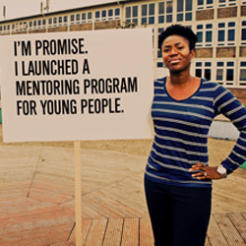Three separate crowdfunding initiatives pledging to unlock grassroots giving were launched within two days of each other this week as crowdfunding juggernaut Kickstarter announces it’s raised £22.5m in its first year in the UK.
JustGiving put its weight behind one new initiative, with its new Yimby. Yimby is targeted at individuals wanting to trial initiatives to address problems in their local communities. While the focus is individual, in its trial phase Yimby found some of these grassroots initiatives evolved into fully-fledged charities. The site, launched yesterday, will give projects 30 days to get fully funded.
A beta site, which has housed 250 projects, has raised £250,000, with a success rate of 64 per cent for projects listed. More than 100 projects have been funded through Yimby already. Yimby is housed within JustGiving, with a dedicated team from that company working on the project.
JustGiving, which was the first online sponsorship site, has grand ambitions for Yimby. “We believe that this will not only be a force for good, but will make people more philanthropic generally, which will grow the giving pie nationwide,” said JustGiving co-founder Zarine Kharas.
Meanwhile yesterday also saw the launch of Spacehive, backed by Ernst & Young and all London Councils. A statement at launch said that this crowdfunding initiative will enable the capital’s 33 councils to “share the cost online of cool stuff”. Spacehive, which also has undergone a beta phase, expects to unleash millions of pounds for regeneration projects in the capital. Ernst & Young is planning to bring other corporates on board to set up match fund partnerships for projects.
Spacehive founder Chris Gourlay said that the platform is risk-free for both councils and pledgers – the public will effectively vote with their wallets on their most favoured projects, and those pledgers will only be charged if their preferred project is ready to launch. Gourlay said he aimed to do for civic planning what other crowdfunding platforms had done for the arts. “If we can do it for movies and apps, then we can do it for civic projects too,” he said.
The third new launch, which beat Spacehive and Yimby by a day, is geared more towards community groups. The Community First CrowdMatch Challenge is backed by funds from the government’s Community First initiative, and supported by the Community Development Foundation, Nesta and crowdfunding platform Buzzbnk. Organisations which want to access the CrowdMatch Challenge will first have to apply to their local Community First panel; if accepted, they will then be supported to run a crowdfunding campaign and receive match funding from that same panel when their fundraising milestones are reached.
Community Development Foundation head of programmes Jason Nuttall said: “Crowdfunding is a great way for community projects to increase their profile, and gather support from local people.” The Community First match fund initiatives have something of a chequered history; civilsociety.co.uk revealed this summer that there had been significantly below expectation levels of giving to the Community First Endowment Match Fund. Community First is a government initiative which has at its disposal a total of £80m to incentivise giving through match funding.
Crowdfunding has been around for some years, with the success of Kickstarter in the US and with microfinance initiatives such as Kiva and GlobalGiving internationally. It is a web-based form of fundraising, whereby an individual or group puts forward a specific project for funding for a specific amount. Individuals are invited to pledge towards that fundraising total and may or may not receive something in return (CDs from a band wanting to record, protype products, etc). Typically, if the project is not fully funded, no payments are taken.
Three crowdfunding initiatives launched in two days
14 Nov 2013
News
Three separate crowdfunding initiatives pledging to unlock grassroots giving were launched within two days of each other this week as crowdfunding juggernaut Kickstarter announces it’s raised £22m in its first year in the UK.









